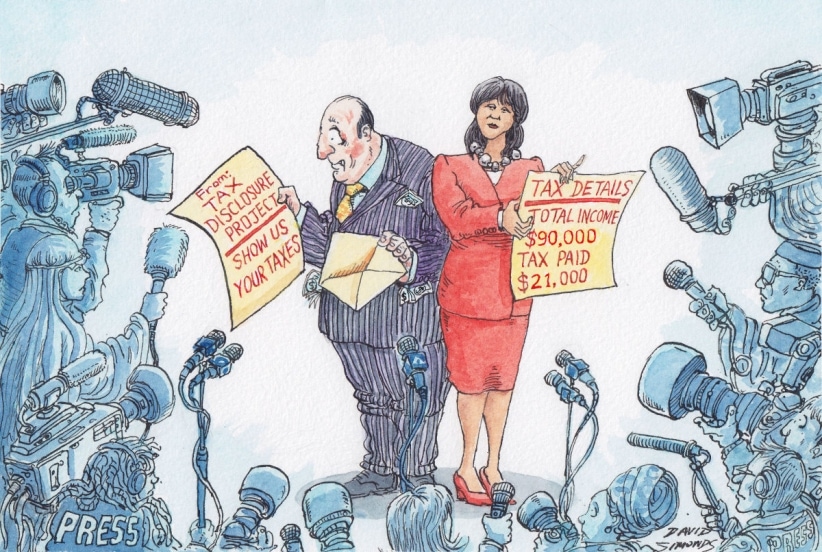
By Juan Andres Guzmán
Translated by Christian Scheinpflug
Seven thousand parliamentarians in 20 countries are these days receiving a second formal request to make the origin of their income transparent by disclosing their tax returns. Some have already responded to the request by Finance Uncovered, an international network of investigative finance journalists, acting with the conviction that citizens are entitled to know where the income by those who make the law derives from. In Chile, 120 members of parliament and 38 senators have received this request. Two replied.
Recently, Chile’s representatives received in their official inboxes an Email reminding them of the request made nearly 15 days ago: to release their tax returns. The request was issued by Finance Uncovered, a non-profit organization that brings together investigative journalists from around the world in the area of finance. Last February – and from London – the entity, of which CIPER is part, launched a global campaign to enable citizens in every country to know the sources of income of politicians who were elected to legislate.
Thus, these days more than seven thousand parliamentarians in 20 countries (including Chile) received an email saying:
In no way are we accusing an irregularity or offense. But we would be grateful if you as acting parliamentarian could answer a series of simple questions that will help in the international quest for more transparency.
• Do you support initiatives to make tax affidavits and financial assets of elected legislators available on a regular basis for monitoring by the public?
• What doubts and questions may you have against such proposals?
• Did you ever present a tax affidavit to the tax authority in your country?
• Could you provide us with a copy of your latest tax affidavit?
• Please indicate the precise amount of taxes paid during the last full fiscal year.
• If you decide not to share a copy of your latest affidavit with us, nor indicate how much you paid in taxes, could you state your reasons?
The information provided by Finance Uncovered indicates that 15 days after the first request, dozens of politicians worldwide have already responded to the call. As important as this first response, is the debate that has been generated in different countries regarding the need for citizens to see the sources of their elected representatives’ income.
For example, in Hungary, a fraction of the Socialists proposed an initiative that made it a legal exigency for parliamentarians to publicize their tax returns.
READ MORE : 7,000 politicians including Chilean parliamentarians asked to reveal their taxes
In the group of parliamentarians who responded to Finance Uncovered’s call are two Chileans: Gabriel Boric (Movimiento Autonomista), MP for Magallanes, and Giorgio Jackson (Revolución Democrática), MP for Santiago Downtown. Both sent statements filed with the tax authority (Servicio Impuestos Internos, (SII) Form 22), corresponding to their years in parliament, 2014 and 2015 (that tax returns relate to the income of the previous year, so the one for 2016 is delivered in April 2017).
These statements – and the others that’ll be added within the next few days – will be available on the website of Finance Uncovered at the beginning of April, when the names of the parliamentarians who have revealed their taxes and those who haven’t are disclosed. Thereafter, a messaging system will be set up, so that citizens can write to the parliamentarians in their constituencies, asking them to release their incomes.
Nick Mathiason, co-director of Finance Uncovered, said at the launch of the campaign: “There is a clear and substantial public interest in elected representatives fully disclosing their income sources and tax returns. The elected representatives are paid by taxpayers to make decisions about taxes and about how our money is spent for the benefit of all”.
With regard to the worldwide acceptance of the call so far, Mathiason said: We have received responses from legislators in many countries, including Bosnia, South Africa and the United Kingdom. In Hungary, press reports indicate that the Socialist Party is considering to introduce a law to force tax transparency among parliamentarians.
In his statement corresponding to revenues received in 2014, MP Giorgio Jackson recorded a total of CLP$ 82.079.363 while paying taxes (global complementary) of CLP$ 17.157.206. Additionally, he included fees of CLP$ 560.133 for the copyrights of the book El país que soñamos (The country we dream) (Debate, 2013). Mr. Jackson’s form also recorded a tax refund over CLP$ 2.982.398.
This return is explained because the Chamber of Representatives, effecting the monthly payment of his diet, retained a tax amount as if Mr. Jackson had received income for the current year (12 months) not 10, as actually happened, since only in March that year the MP began his parliamentary term.
In 2015, meanwhile, Mr. Jackson had an income of CLP$ 107.810.119 and paid CLP$ 26.578.809 tax. Apart from his diet as a parlamentarian, Mr. Jackson also received copyright fees for his book, this time CLP$ 230.755, and he received a return of CLP$ 278.
Gabriel Boric only recorded as income his parliamentary diet. In 2014, he received CLP$ 82.120.918 and paid CLP$ 16.949.775 in tax, receiving a return of CLP$ 3.132.511 (the same explanation of this return as that of Mr. Jackson applies to Mr. Boric). By 2015 his diet was CLP$ 107.579.364, his paid tax amounted to CLP$ 26.486.507, while SII returned CLP$ 9.000.
In the last 13 years the remuneration of Chilean parliamentarians has increased 245%, El Mostrador reported in 2014. The data disclosed by both parliamentarians show that their monthly income amounts to CLP$ 8.9 million (this figure does not contemplate the parliamentary advisory services that correspond to them, amounting to CLP$ 25 million annually for each MP).
Both MPs have led a campaign to limit the remuneration of parliamentarians to a maximum of 20 times the monthly minimum wage (currently CLP$264.000). So far they have not succeeded.
In light of the high remuneration they receive, which places them among the best paid of OECD countries, Mr. Boric told CIPER that one must insist “the representative or senator must comply with the legal as well as the ethical duty to pursue exclusively a full-time parliamentary job. We have a ridiculously high salary for that”.
Mr. Boric also explained that he decided to accede to the request formulated by Finance Uncovered and disclose his tax returns, because he believes it necessary that people know fully their representatives in Congress: “What has become clear recently, through cases such as Soquimich or Corpesca (revolving around shady campaign financing and plain corruption), is that there have often been interests outside democratic channels, influencing disproportionately and unethically in spaces of deliberation that must be transparent”.
For MP Boric, taxes have a central character in a democracy and this makes it important for legislators to show their tax behavior: whether they pay what they owe or avoid taxes employing various tricks:
“Taxes make you part of a community, because they are an income distribution mechanism. Therefore, when a parliamentarian uses practices to pay less taxes, they negate their collectiveness. An example is ex-President Piñera, who bought shell companies to be able to pay less tax. Although that stays within the legal frame, it contradicts the spirit of the law that seeks the good of the community”, Mr. Boric affirmed to CIPER.
Giorgio Jackson said he decided to participate in this initiative, because “money is power and the democratic utopia we try to reach requires to denude the spaces of power. That implies to show the money flows that each of us receives”. And he explained that today more than ever it is “important that we do not leave space to doubts and to double engagements, like being in politics and in businesses”.
Mr. Jackson views the initiative of Finance Uncovered as a healthy idea for democracy: “It is necessary to begin to rebuild trust between politics and citizens, confidence that has been broken, because in recent years we have discovered contractual relations between legislators and economic powers.
I am also concerned that a tax planning practice has spread among parliamentarians. It would be important to know to what extent this has happened, because legislators influence how taxes are collected and how avoidance is considered”, Mr. Jackson added.
He insists on this latter point since he has clear memories of what happened when he began in March 2014: he was offered to reduce his tax burden via different designs.
“There are people who are every day in Congress trying to convince you to adopt these structures to pay less tax. We are talking about strategies that generate significant discounts, like for example, forming family companies allowing to downgrade global complementary tax”, said the MP for Santiago Downtown.
For Mr. Jackson, if a parliamentarian adopts this approach to pay tax creates complexity, because he or she is assuming that evading taxes is good: “I think that there are many people who accept bad practices because these are not illegal. In order to restore citizens’ trust, we must move towards an area in which politics goes beyond the legal: into the ethical”.
This article has been translated and republished with the permission of CIPER Chile, Centre for Investigative Journalism. The original article, in Spanish, can be found here.



